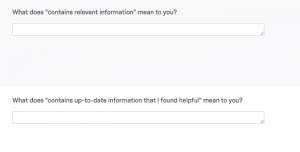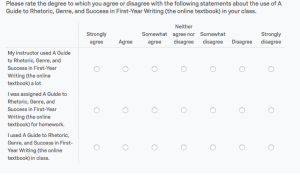Source Types & Ethical Use
47 Conducting Your Own Primary Research
Melanie Gagich
It is possible that at some point in your college career you will be asked to conduct research yourself, and in that case, this chapter will be very useful. Yet, even if you are not asked to conduct your own research, this chapter provides helpful information to aid you in understanding the primary research created by academics in the social sciences.
Specifically, this section provides you with information pertaining to research questions, research methods, research instruments, and research article methodology sections in the hopes that it will help you properly read academic research and eventually conduct and/or propose your own study.
A key fact to keep in mind: methodological choices must align with the research question(s), which informs the type of instruments used.
Research Questions
Research questions guide an academic study. These questions should not be easily answered. For example, the question, “How many people live in the US” is not an appropriate research question because it is easily answered (i.e. you can Google to find the answer) and the answer does not add new knowledge to a field or discipline.
While you might sometimes be asked to write a research question in college writing, these are often questions that will lead you to arguments and evidence that already exist. Ideally, a research question represents a researcher’s attempt to create new knowledge in the field.
Research Methods
The word “research methods” broadly refers to the tools you will use to gather evidence to respond to your research question. There are three types of research methods: qualitative, quantitative, and mixed. Your choice of research methods depends on your research question and the type of data you need to collect to answer that question.
Qualitative Methods
Some research questions focus on language, experiences, observations, and motivations . These types of questions require qualitative methods to answer them, and generate non-numerical data.
Qualitative methods are often used in the following situations:
- You want to study a phenomenon/occurrence in detail. Example research question: How does a freshman ENGL 1020 student describe their writing processes?
- You want to focus on individual interpretations/experiences. Example research question: What are the experiences of 18-25 year old people using Fitbits for tracking their activity?
To gather qualitative data, researchers often use research interviews, open-ended survey questions, or focus groups. Example of open-ended survey questions: What was your experience of transitioning to college writing?
The following is an example of open-ended survey questions as found in a sample survey:

Quantitative Methods
Other research questions focus on quantifying a problem and generating numerical data. These types of research questions require quantitative methods to answer them.
Quantitative methods are often used in the following situations:
- You want to understand the relationship among variables. Example research question: identity markers and student major selection
- You want to understand the difference among variables. Example research question: What is the difference in career satisfaction between students who major in the humanities versus students who major in business?
To gather quantitative data, researchers often use surveys that include closed-ended questions and Likert-Scale items.
The following are examples of closed-ended survey questions as found in a sample survey and Likert-Scale survey items found in a sample survey:


Mixed Methods
Sometimes you need to use both quantitative and qualitative methods to answer a research question. This is known as mixed methods and produces numerical and non-numerical data, which can be collected using a variety of research instruments (including those described above).
The Methodology Section in an Academic Research Article
In an empirical research article, there will be a section outlining the methodology for the study that was conducted. Empirical research refers to knowledge that is gained “by means of direct and indirect observation or experience.” Including a methodology section in an academic research paper provides the audience with important information needed to understand how the study was conducted, such as the participants and the setting of the study as well as descriptions of data collection and analysis.
Media Attributions
- Section X open ended
- Section X closed ended
- Section X Likert Scale
a question that guides an academic study in such a way that the answer adds new knowledge to a field or discipline
broadly refers to tools for collecting data; research methods may be qualitative, methods that collect discursive data that cannot be counted; quantitative, methods that collect numeric or countable data; and mixed, methods that draw on both quantitative and qualitative measures
methods that collect observable or discursive data, which may include opinions or experiences and which generate non-numerical data
methods that collect and generate numerical or countable data
uses both quantitative and qualitative methods to answer a research question; produces numerical and non-numerical data, which can be collected using a variety of research instruments

